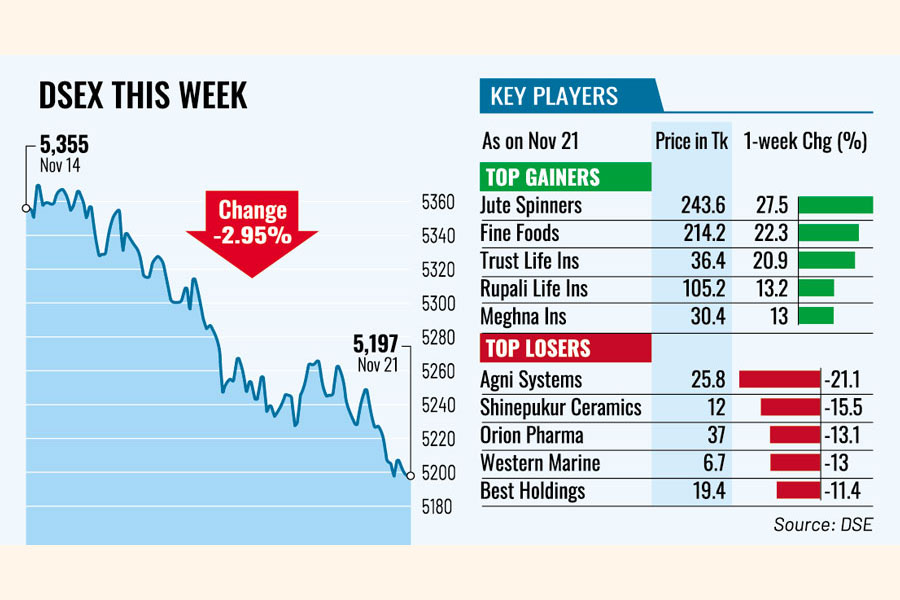Stocks suffer sharp fall on fresh worries about economy
Market cap sheds Tk 107b as large caps plunge

Published :
Updated :

The benchmark equity index finished sharply lower this week, wiping out all the gains from the previous two weeks, as it plunged below 5,200 mark, reflecting the growing concerns over ongoing political and economic tensions in the country.
Market operators said recent disclosure of record non-performing loans in the banking sector coupled with the country's downgraded sovereign ratings by Moody's negatively impacted the investor sentiment.
The news of a massive negative equity, surpassing Tk 97 billion, in the capital market stoked the prevailing investor pessimism.
This week, the market opened with profit-booking sell pressure while cautious investors remained watchful of the market's momentum amid earnings disclosures.
The bears regained control as investment appetite remained subdued over uncertainties regarding the market outlook due to prevailing economic and political tensions.
As a result, of the five trading days this week, the market closed lower four days while one session managed to eke out gains with low turnover.
And the benchmark DSEX index of the Dhaka Stock Exchange (DSE) settled the week 158 points or 2.95 per cent lower at 5,197, snapping a three-week rally. It had gained 241 points in the past three consecutive weeks.
The market-cap shed Tk 107 billion to reach Tk 6,627 billion at the end of the week. The market-cap is calculated by multiplying the total number of a company's outstanding shares by the current market price.
EBL Securities, in its analysis, said stocks observed a lackluster week amid lower market participation, as investor sentiment remained subdued, while the latest downgrade ratings by Moody has further triggered the prevailing pessimism.
The disclosure of a record amount of non-performing loans (NPLs) in the banking sector, coupled with the downgrading of sovereign ratings of the country by Moody's heightened worries surrounding the equity market, it added.
NPLs in the banking sector soared to a historic Tk 2.85 trillion in September, accounting for around 17 per cent of total outstanding loans. The real financial condition3of the banks has been exposed by the interim government.
Moody's downgraded Bangladesh's long-term ratings to B2 from B1 and said the outlook has been changed to "negative" from "stable".
Liquidity risks, external vulnerabilities and banking sector risks have been magnified by the recent political and social unrests that led to a change in the government, said Moody's.
This is the backdrop against which last week's approval of a sovereign-guaranteed loan of Tk 30 billion to state-run Investment Corporation of Bangladesh failed to elicit positive investor response.
Investors remained mostly cautious in the prevailing economic environment and amid political uncertainties, said a leading stockbroker.
This week, substantial price erosion of some large-cap stocks and blue-chip stocks such as Islami Bank, Beximco Pharma, BAT Bangladesh, Brac Bank and Square Pharma largely contributed to the index plunge.
They jointly accounted for a 68-point weekly fall in the index. Islami Bank alone accounted for almost a 27-point fall.
Two other indexes of the DSE also fell this week. The DS30 index, a group of 30 prominent companies, lost around 67 points to 1,919 while the DSES index, which represents Shariah-based companies, plunged 38 points to 1,151.
Turnover, a crucial indicator of the market, stood at Tk 23.29 billion this week, down from Tk 27.70 billion in the week before.
Accordingly, the average daily turnover dropped to Tk 4.66 billion, a 16 per cent down from the previous week's average of Tk 5.54 billion.
Investors were mostly active in the pharma sector, which accounted for 13.5 per cent of the week's total turnover, followed by banking (13.3 per cent) and textile (9.8 per cent).
Most of the traded stocks saw price correction, as out of 382 issues traded, 287 closed lower, 72 higher, and 23 remained unchanged.
All the major sectors suffered losses, with the power sector enduring the highest decline of 3.9 per cent, followed by banking (3 per cent), pharmaceutical (2.79 per cent), food (2.68 per cent), telecoms (2.6 per cent) and engineering sector (2.5 per cent).
Agni Systems was the most-traded stock with shares worth Tk 740 million changing hands, followed by Sonali Aansh, Islami Bank, Bangladesh Shipping Corporation and Beximco Pharma.
The Chittagong Stock Exchange (CSE) also ended lower, with CSE All Share Price Index (CASPI) shedding 296 points to settle at 14,584 and its Selective Categories Index (CSCX) losing 174 points to 8,888.
The port-city bourse traded 14 million shares and mutual fund units with a turnover value of Tk 403 million.
babulfexpress@gmail.com


 For all latest news, follow The Financial Express Google News channel.
For all latest news, follow The Financial Express Google News channel.